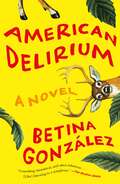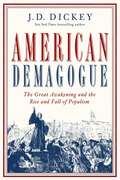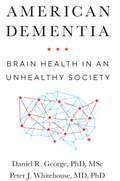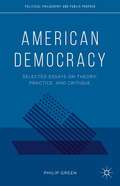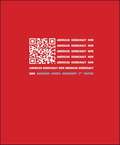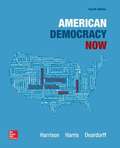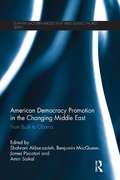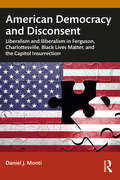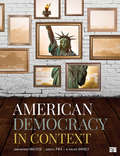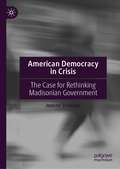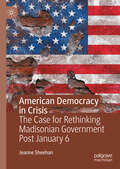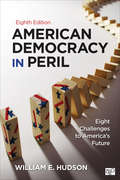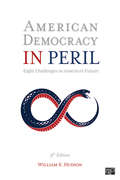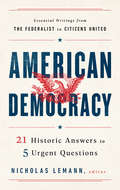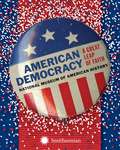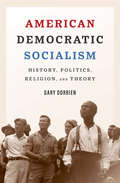- Table View
- List View
American Delirium: A Novel
by Betina González"Unsettling, fantastical, and often hilarious . . . [Like] listening to a symphony."—The Boston GlobeFrom award-winning novelist Argentine Betina González, American Delirium is a dizzying, luminous English-language debut about an American town overrun by a mysterious hallucinogen and the collision of three unexpected characters through the mayhem. In a small Midwestern city, the deer population starts attacking people. So Beryl, a feisty senior and ex-hippie with a troubled past, decides to take matters into her own hands, training a squad of fellow retirees to hunt the animals down and to prove to society they’re capable of more than playing bingo. At the same time, a group of protesters decides to abandon the “system” and live in the woods, leaving behind the demands of modern life—including their children. Nine-year-old Berenice never thought her mother would join the dropouts, but she’s been gone for several days, leaving only a few clues about her past for Berenice to piece together.Vik, a taxidermist at the natural history museum and an immigrant from the Caribbean, is beginning to see the connections among the dropouts, the deer, and the discord. He’s not normally the type to speak up, but when he finds a woman living in his closet, he’s forced to get involved. Each of these engrossing characters holds a key to the city’s unraveling—despite living on the margins of society—and just as their lives start to spin out of control, they rescue one another in surprising ways.
American Demagogue: The Great Awakening And The Rise And Fall Of Populism
by J. D DickeyIn September 1740, New England experienced a social earthquake. It arrived not in the form of a great natural disaster or an act of violence, but with the figure of a twenty-year-old preacher. People were abuzz with his stunning oratory, his colorful theatrics, and his almost ungodly sense of power and presence.When George Whitfield arrived in the American colonies, his reputation and growing legend had been built on his brilliant speeches and frightening tirades, and his fame exploded. He demanded his listeners repent their sins and follow the true word of God—his. He had knowledge that only he could unlock for the American people. Whitefield's message also carried a threat, and he brooked no dissent. Whitefield's power over his listeners grew, and New England was in the uproar of a social revolution. This period became known as The Great Awakening, and it would weave its way into the very fabric of what American would eventually become. Soon after Whitefield reached his zenith, things began to fall apart. The puritanical utopia that once seemed so certain vanished like a dream. American Demagogue is the story of this rapid rise and equally steep fall, which would be echoed by authoritarian populists in later centuries and American demagogues yet to come.
American Dementia: Brain Health in an Unhealthy Society
by Daniel R. George Peter J. WhitehouseHave the social safety nets, environmental protections, and policies to redress wealth and income inequality enacted after World War II contributed to declining rates of dementia today—and how do we improve brain health in the future?For decades, researchers have chased a pharmaceutical cure for memory loss. But despite the fact that no disease-modifying biotech treatments have emerged, new research suggests that dementia rates have actually declined in the United States and Western Europe over the last decade. Why is this happening? And what does it mean for brain health in the future?In American Dementia, Daniel R. George, PhD, MSc, and Peter J. Whitehouse, MD, PhD, argue that the current decline of dementia may be strongly linked to mid–twentieth century policies that reduced inequality, provided widespread access to education and healthcare, and brought about cleaner air, soil, and water. They also• explain why Alzheimer's disease, an obscure clinical label until the 1970s, is the hallmark illness of our current hyper-capitalist era;• reveal how the soaring inequalities of the twenty-first century—which are sowing poverty, barriers to healthcare and education, loneliness, lack of sleep, stressful life events, environmental exposures, and climate change—are reversing the gains of the twentieth century and damaging our brains;• tackle the ageist tendencies in our culture, which disadvantage both vulnerable youth and elders;• make an evidence-based argument that policies like single-payer healthcare, a living wage, and universal access to free higher education and technical training programs will build collective resilience to dementia;• promote strategies that show how local communities can rise above the disconnection and loneliness that define our present moment and come together to care for our struggling neighbors.Ultimately, American Dementia asserts that actively remembering lessons from the twentieth century which help us become a healthier, wiser, and more compassionate society represents our most powerful intervention for preventing Alzheimer's and protecting human dignity. Exposing the inconvenient truths that confound market-based approaches to memory enhancement as well as broader social organization, the book imagines how we can act as citizens to protect our brains, build the cognitive resilience of younger generations, and rise to the moral challenge of caring for the cognitively frail.
American Democracy
by Philip GreenThe book examines the problems that plague contemporary American democracy. Written from the standpoint of democratic theory, and from a progressive point of view, the book explores different facets of American democratic culture and its various deficits deficits that can lead to the crippling of democratic politics. "
American Democracy Now (3rd Edition)
by Brigid Callahan Harrison Jean Wahl Harris Michelle D. DeardorffAmerican Democracy Now, compiled to aid students through the learning process for the American Government. its uniquely collated to achieve better performance on the students, with specific objectives, as it engages the them in the course as well as become better citizens
American Democracy Now (AP American Democracy)
by Brigid Callahan Harrison Jean Wahl Harris Michelle D. DeardorffNIMAC-sourced textbook
American Democracy Now (Third Edition)
by Jean Harris Brigid Harrison Michelle DeardorffIncrease student performance, student engagement, and critical analysis skills with the third edition of American Democracy Now. This program is available with GinA, an educational game in which students learn American Government by doing, as well as McGraw-Hill's LearnSmart, an adaptive questioning tool proven to increase content comprehension and improve student results. Unique to this program, American Democracy Now 3e is a student-centered text focused on student performance. This contemporary approach and design, coupled with market-leading digital products, make this an ideal solution to course goals.
American Democracy Now, 4th Edition
by Brigid C. Harrison Jean Harris Michelle D. DeardorffAmerican Democracy Now transforms the Government course through innovative, adaptive technology that makes government relevant to today's students. The Then, Now, Next framework provides contemporary examples and historical context that challenge students to think critically about how the American Democracy will continue to evolve.
American Democracy Now, AP Edition
by Jean Harris Brigid Harrison Michelle Deardorff Nicole Reale Lisa Ellison Douglas ZywiolNIMAC-sourced textbook
American Democracy Now: AP Edition
by Rebecca Small Brigid Callahan Harrison Jean Wahl Harris Michelle D. DeardorffNIMAC-sourced textbook
American Democracy Promotion in the Changing Middle East: From Bush to Obama (Durham Modern Middle East and Islamic World Series)
by Amin Saikal Shahram Akbarzadeh James Piscatori Benjamin MacQueenThe recent "Arab spring", with its popular uprisings in many Arab countries, has exposed the ambiguity at the heart of American promotion of democracy in the Middle East. The US invasions of Afghanistan and Iraq were packaged as democracy promotion, as heralding the beginning of a new phase in the politics of the Middle East when democracy would replace authoritarian regimes. Many of these authoritarian regimes, however, were sustained by US support. The recent popular uprisings threaten to bring democracy without promotion by the US, and threaten to overthrow regimes previously supported by the US and important for US strategy in the region – hence an initial hesitant response by the US to some of the uprisings. This book explores the contradictions in American democracy promotion in the Middle East. It discusses the principles underlying US democracy promotion, and the debates surrounding US policy formation, and examines the application of US democracy promotion in specific cases. It concludes by assessing the likely future patterns of US engagement with democratic reform in the Middle East.
American Democracy and Disconsent: Liberalism and Illiberalism in Ferguson, Charlottesville, Black Lives Matter, and the Capitol Insurrection
by Daniel MontiThis volume is a thorough re-examination of civil unrest and discontent in the United States, particularly the intersection of democracy and violence. The work argues that unrest and violence are embedded rituals of social and political "disconsent" and are constitutive features of citizen-based democracy.As such, they are part of how democratic life works: unrest is the eruptive, visible grammar of citizens in a democratic society. Democracy and citizen unrest and violence in the United States are set within a deeper history. The author traces the roots of American democracy – and the rituals of disconsent – to their sources in ancient Mediterranean political society, demonstrating that early democratic theory and practice understood unrest and revolt as morally grounded. Featuring case studies of recent episodes of political and social "disconsent" in the United States, the volume contextualizes the Black Lives Matter protests, unrest around police and institutional violence, and the Capitol insurrection on January 6.Through this, the book provides an important social theoretical lens through which to understand American discontent around racial injustice, political suppression, and citizen disillusionment.
American Democracy in Context
by John Anthony Maltese W. Phillips Shively Joseph A. PikaDiscover what makes American democracy unique and how its government impacts your life American Democracy in Context provides a combined comparative and historical approach to inspire students to better understand American government and become active citizens. Bestselling authors Maltese, Pika, and Shively explain the distinctive features of how Americans practice democracy—how they vote, translate election results into representation of interests, make policy decisions, enforce laws and maintain justice—and how those practices differ from other democracies throughout the world. The emphasis is always on the American political system, but the search for understanding encourages students to examine how the American system has developed over time (historical context) and how it compares with similar practices in other democracies (comparative context). This combined approach motivates students to understand why politics is relevant to their everyday lives and how they can affect changes and make a difference. This title is accompanied by a complete teaching and learning package. Digital Option / Courseware SAGE Vantage is an intuitive digital platform that delivers this text’s content and course materials in a learning experience that offers auto-graded assignments and interactive multimedia tools, all carefully designed to ignite student engagement and drive critical thinking. Built with you and your students in mind, it offers simple course set-up and enables students to better prepare for class. Assignable Video with Assessment Assignable video (available with SAGE Vantage) is tied to learning objectives and curated exclusively for this text to bring concepts to life. LMS Cartridge (formerly known as SAGE Coursepacks): Import this title’s instructor resources into your school’s learning management system (LMS) and save time. Don’t use an LMS? You can still access all of the same online resources for this title via the password-protected Instructor Resource Site.
American Democracy in Context
by John Anthony Maltese W. Phillips Shively Joseph A. PikaDiscover what makes American democracy unique and how its government impacts your life American Democracy in Context provides a combined comparative and historical approach to inspire students to better understand American government and become active citizens. Bestselling authors Maltese, Pika, and Shively explain the distinctive features of how Americans practice democracy—how they vote, translate election results into representation of interests, make policy decisions, enforce laws and maintain justice—and how those practices differ from other democracies throughout the world. The emphasis is always on the American political system, but the search for understanding encourages students to examine how the American system has developed over time (historical context) and how it compares with similar practices in other democracies (comparative context). This combined approach motivates students to understand why politics is relevant to their everyday lives and how they can affect changes and make a difference. This title is accompanied by a complete teaching and learning package. Digital Option / Courseware SAGE Vantage is an intuitive digital platform that delivers this text’s content and course materials in a learning experience that offers auto-graded assignments and interactive multimedia tools, all carefully designed to ignite student engagement and drive critical thinking. Built with you and your students in mind, it offers simple course set-up and enables students to better prepare for class. Assignable Video with Assessment Assignable video (available with SAGE Vantage) is tied to learning objectives and curated exclusively for this text to bring concepts to life. LMS Cartridge (formerly known as SAGE Coursepacks): Import this title’s instructor resources into your school’s learning management system (LMS) and save time. Don’t use an LMS? You can still access all of the same online resources for this title via the password-protected Instructor Resource Site.
American Democracy in Crisis: The Case for Rethinking Madisonian Government
by Jeanne SheehanPublic disenchantment with and distrust of American government is at an all-time high and who can blame them? In the face of widespread challenges—everything from record levels of personal and national debt and the sky high cost of education, to gun violence, racial discrimination, an immigration crisis, overpriced pharmaceuticals, and much more—the government seems paralyzed and unable to act, the most recent example being Covid-19. It’s the deadliest pandemic in over a century. In addition to an unimaginable sick and death toll, it has left more than thirty million Americans unemployed. Despite this, Washington let the first round of supplemental unemployment benefits run out and for more than a month were unable to agree on a bill to help those suffering. This book explains why we are in this situation, why the government is unable to respond to key challenges, and what we can do to right the ship. It requires that readers “upstream,” stop blaming the individuals in office and instead look at the root cause of the problem. The real culprit is the system; it was designed to protect liberty and structured accordingly. As a result, however, it has left us with a government that is not responsive, largely unaccountable, and often ineffective. This is not an accident; it is by design. Changing the way our government operates requires rethinking its primary goal(s) and then restructuring to meet them. To this end, this book offers specific reform proposals to restructure the government and in the process make it more accountable, effective, and responsive.
American Democracy in Crisis: The Case for Rethinking Madisonian Government Post January 6
by Jeanne SheehanThis book analyzes the roots of widespread disenchantment with American government. While blame often falls on the individuals in office, they are not operating in isolation. Rather they are working within a system designed by the Framers with one goal in mind, protectionism. Although the Framers got much right, their commitment to protection of liberty led them to design a system replete with divisions of power. Whatever its merits at the founding, the government today is frequently described as dysfunctional and far too often unresponsive to the majority, unaccountable, and unable to deliver for its people. For those disillusioned with the current state of government and committed to effectuating meaningful change, this book advocates in favor of a fundamental reassessment of the system's primary objectives, followed by deliberation as to how it should be restructured accordingly. It not only presents specific reform proposals, but it ends with a stark warning: until and unless we embrace reasoned structural reform, we cannot be surprised if at some point the people become so frustrated that they either disengage, fight back, or seek solace in autocratic alternatives. This new edition includes audiobook files created by a state of the art text-to-speech tool at the chapter level.
American Democracy in Peril: Eight Challenges to America's Future
by William E. HudsonIn this Eighth Edition of American Democracy in Peril, author William E. Hudson provides a perceptive analysis of the challenges our democracy faces in the current era: economic crisis, partisan gridlock, rising economic inequality, and continued military conflict in the Middle East and elsewhere. By introducing the history of democratic theory in terms of four “models” of democracy, he provides readers with a set of criteria against which to evaluate the challenges discussed later. This provocative book offers a structured, yet critical examination of the American political system, designed to stimulate students to consider how the facts they learn about American politics relate to democratic ideals.
American Democracy in Peril: Eight Challenges to America's Future
by William E. HudsonIn this Eighth Edition of American Democracy in Peril, author William E. Hudson provides a perceptive analysis of the challenges our democracy faces in the current era: economic crisis, partisan gridlock, rising economic inequality, and continued military conflict in the Middle East and elsewhere. By introducing the history of democratic theory in terms of four “models” of democracy, he provides readers with a set of criteria against which to evaluate the challenges discussed later. This provocative book offers a structured, yet critical examination of the American political system, designed to stimulate students to consider how the facts they learn about American politics relate to democratic ideals.
American Democracy in Peril: Eight Challenges to America′s Future (Studies In Political Thinking)
by William E. HudsonAmerican Democracy in Peril encapsulates the tumultuous state of American politics. By introducing the history of democratic theory in terms of four "models" of democracy, Hudson provides readers with a set of criteria against which to evaluate the challenges discussed later. This provocative book offers a structured yet critical examination of the American political system, designed to stimulate students to consider how the facts they learn about American politics relate to democratic ideals. This new edition incorporates the Trump Presidency and the polarization that has accompanied his leadership.
American Democracy in Peril: Eight Challenges to America′s Future (Studies In Political Thinking)
by William E. HudsonAmerican Democracy in Peril encapsulates the tumultuous state of American politics. By introducing the history of democratic theory in terms of four "models" of democracy, Hudson provides readers with a set of criteria against which to evaluate the challenges discussed later. This provocative book offers a structured yet critical examination of the American political system, designed to stimulate students to consider how the facts they learn about American politics relate to democratic ideals. This new edition incorporates the Trump Presidency and the polarization that has accompanied his leadership.
American Democracy in Peril: Seven Challenges to America's Future (3rd edition)
by William E. HudsonThis book expands exploration of what Hudson considers are the major challenges to American democracy: the separation of power; radical individualism; citizen participation; trivialized elections; the privileged position of business; inequality; and the national security system.
American Democracy: 21 Historic Answers to 5 Urgent Questions
From The Federalist to Citizens United, bestselling author Nicholas Lemann presents key writings on five crucial questions confronting American democracy todayAmid the frenzied overload of 24-hour cable news and incessant social media, at a time when many of us fear for the future of our democracy, it is becoming harder and harder to think clearly about politics. American Democracy: 21 Historic Answers to 5 Urgent Questions provides an alternative for those who want to step back and look to the past for inspiration and guidance. Edited with perceptive and provocative commentary by bestselling historian and journalist Nicholas Lemann (The Promised Land, Transaction Man), the book presents key writings from the American past that speak to five contemporary flashpoints in our political landscape: race, gender, immigration, and citizenship; opportunity and inequality; the purpose and powers of the federal government; money, special privilege, and corruption; and protest and civil disobedience. Some of the selections are well-known--George Washington's letter to the Hebrew Congregation at Newport, Frederick Douglass's "What to the Slave is the 4th of July," Martin Luther King Jr.'s letter from Birmingham Jail--while others will be new to many readers--Horace Mann argument for public schools as a means of fighting inequality, Jane Addams's perceptive analysis of gender and social class in charity work, Randolph Bourne envisioning a "Trans-National America." American Democracy presents a remarkable range of insightful and eloquent American political writing, while serving as an invaluable resource for concerned citizens who wish to become better-informed participants in the ongoing drama of our democracy.
American Democracy: A Great Leap of Faith
by Lisa Kathleen Graddy Barbara Clark Smith Harry R. Rubenstein National Museum of American History William BirdAmerican Democracy: A Great Leap of Faith is the companion volume to an exhibition at the Smithsonian National Museum of American History that celebrates the bold and radical experiment to test a wholly new form of government. Democracy is still a work in progress, but it is at the core of our nation's political, economic, and social life. This lavishly illustrated book explores democracy from the Revolution to the present using objects from the museum's collection, such as the portable writing box that Thomas Jefferson used while composing the Declaration of Independence, the inkstand with which Abraham Lincoln drafted the Emancipation Proclamation, Susan B. Anthony's iconic red shawl, and many more. Not only famous voices are presented: like democracy itself, the book and the exhibition preserve the voice of the people by showcasing campaign materials, protest signs, and a host of other items from everyday life that reflect the promises and challenges of American democracy throughout the nation's history.
American Democratic Socialism: History, Politics, Religion, and Theory
by Gary DorrienA sweeping, ambitious history of American democratic socialism from one of the world&’s leading intellectual historians and social ethicists &“Dorrien is supremely qualified for the task he has set himself in this very thoughtful, necessary, and timely book.&”—Maurice Isserman, author of The Other American: The Life of Michael Harrington Democratic socialism is ascending in the United States as a consequence of a widespread recognition that global capitalism works only for a minority and is harming the planet&’s ecology. This history of American democratic socialism from its beginning to the present day interprets the efforts of American socialists to address and transform multiple intersecting sites of injustice and harm. Comprehensive, deeply researched, and highly original, this book offers a luminous synthesis of secular and religious socialisms, detailing both their intellectual and their organizational histories.
American Demon (Hollows #14)
by Kim HarrisonA thrilling return to the #1 New York Times bestselling urban fantasy series, continuing Rachel Morgan's story.RACHEL MORGAN IS BACK--AND THE HOLLOWS WILL NEVER BE THE SAME.What happens after you've saved the world? Well, if you're Rachel Mariana Morgan, witch-born demon, you quickly discover that something might have gone just a little bit wrong. That the very same acts you and your friends took to forge new powers may have released something bound by the old. With a rash of zombies, some strange new murders, and an exceedingly mysterious new demon in town, it will take everything Rachel has to counter this new threat to the world--and it may demand the sacrifice of what she holds most dear.
